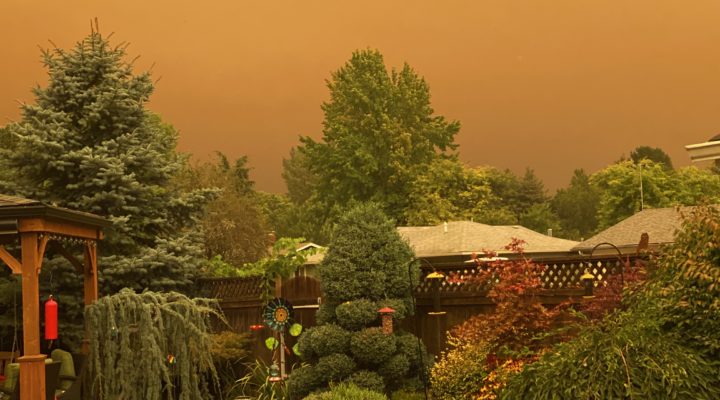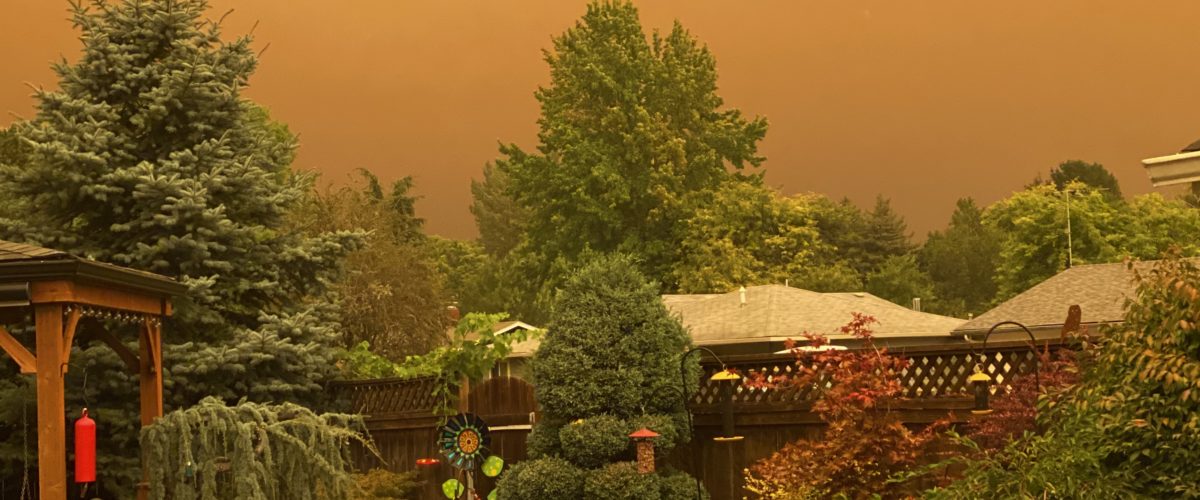The smoke permeates everything. Even with every door and window closed tight. The whole house smells like smoke.
This week, Oregon has erupted in wildfires. Nearly a million acres are burning, and unusual winds from the east have blown the smoke into the Willamette Valley, including Corvallis, where I live.
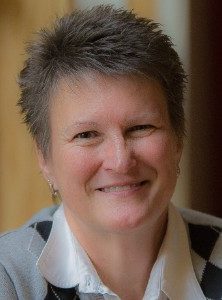
Susan Shaw
My Facebook feed is filled with photos from friends in Oregon — bright orange skies, piles of ash, rooms darkened by smoke even at noon on what should have been an unseasonably hot, sunny September day.
Our Air Quality Index reached 593 at one point this week. For perspective, 1 to 50 is healthy. Anything above 300 is hazardous. Governor Kate Brown used phrases like “unprecedented fire,” “devastating consequences,” and “substantially destroyed” to describe Oregon’s conflagration.
Meanwhile, California and Washington are facing their own disastrous fires. While wildfires are a natural part of the ecosystem of the West, the intensity and scope of these fires are a result of climate change. And scientists only expect things to get worse.
In other parts of the country, climate change brings more powerful hurricanes and tornadoes.
White Christians and climate change
Many Christians, especially white Christians, have embraced denial of climate science. Just over half of white mainline Protestants agree that climate change is a crisis or major problem. Only 44% of white evangelicals say the same. Nearly a quarter say it’s not a problem at all.
Despite the overwhelming scientific consensus on the role of human activity in climate change, only about 40% of white mainline Protestants, 45% of white Catholics, and 28% of white evangelicals accept this fact.
Not surprisingly, more than 70% of Democrats accept that human activity causes climate change, while only 22% of Republicans do. Scholars suggest that politics more than religion may drive these beliefs, especially in such a partisan context as we presently have.
“The West is burning while most white Christians turn away from the root causes of the devastation.”
For now, the West is burning while most white Christians turn away from the root causes of the devastation.
Many white Christians believe God won’t let climate change destroy the earth. Others see climate-related disasters as signs of the end times. White evangelicals continue to support Donald Trump overwhelmingly, even though the Trump administration has tried to roll back more than 100 environmental protection regulations. As of this writing, Trump has offered no words of consolation or support to the West.
Racism and the plight of the poor
Scientists worry that we may already be approaching, if not past, the tipping point for irreversible climate change. And we know that worldwide, poor people are the most vulnerable to the impacts of climate change.
COVID-19 has made health disparities across race, class and gender glaringly visible, and climate change will only exacerbate those disparities if we do not address the systems and practices that contribute to inequality, injustice and climate change. The disturbing link between white evangelical support for Trump and disregard for climate change that disproportionately affects poor people of color around the world should probably not be all that surprising. After all, as religious and Africana studies professor Anthea Butler points out, “Modern evangelicals’ support for this president cannot be separated from the history of evangelicals’ participation in and support for racist structures in America.”
But white Catholics and mainline Protestants also voted for Trump. In 2016, 60% of white Catholics voted for Trump. At the time of Trump’s inauguration, 57% of white mainline Protestants approved of him. In her The Christian Century and the Rise of the Protestant Mainline, Baylor historian Elesha Coffman explained that for the white middle- and upper-class people who make up much of mainline Protestant churches, “The status quo is working pretty well for people who are white, middle class and educated.”
So perhaps the issue is not one of the Bible or theology at all, but of whiteness and of politics of the status quo.
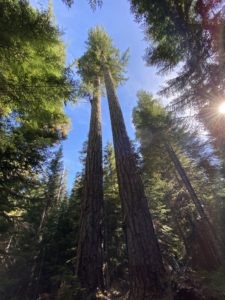
The author took this photo on a hike through old growth in the Willamette National Forest just a few days before the fires erupted.
The inability of so many white Christians to hear the urgency of climate science suggests the depth to which the white church is invested in white supremacy. Poor people of color are both the most vulnerable to the effects of climate change and the ones who contribute least to greenhouse gases. White Christians will have to change, and the system of white supremacy itself will have to be dismantled, if we have any hope of averting irreversible climate disaster. For now, the white church is mostly complicit with the intersecting systems of racism and global capitalism that underlie climate change.
For those of us who believe the biblical witness is one of environmental stewardship and care for our neighbors, we must work toward systemic changes that can begin to reverse decades of production of greenhouse gasses and unbridled consumption. We cannot claim to love God and love our neighbors if we do not address the crisis of climate change.
The Doomsday Clock
Because COVID has prevented travel far from home, my partner and I have spent the summer hiking Willamette and Siuslaw National Forests. Again and again we told ourselves, “Well, if you have to be trapped somewhere because of a pandemic, Oregon’s not a bad place to be trapped.” We loved seeing places in our state we’d never visited — verdant paths through old-growth forests to hidden lakes and waterfalls. We already were scouting places for our next several hikes. But that was a few days ago. Now, many of the places we planned to hike are gone, as are many of the small towns that dotted the roads through the forests.
We can’t afford to continue to deny climate change.
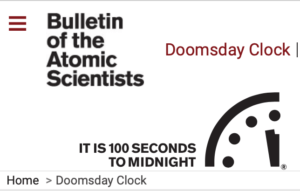 In January of this year, atomic scientists set the doomsday clock to 100 seconds before midnight, the closest it’s ever been to the expectation of human annihilation. The clock first appeared in 1947 as a warning about a nuclear arms race between the U.S. and the Soviet Union. Scientists set the clock then at 7 minutes before midnight. While the clock has moved a number of times, in 1953, it moved to two minutes before midnight after Russia tested a hydrogen bomb, following the U.S.’ 1952 test. The next time the clock came that close to midnight was January 2018 when it was again set at two minutes until midnight because of the problem of climate change. It moved even closer in January 2020, driven still by climate change and the possibilities of nuclear war, exacerbated by “a threat multiplier, cyber-enabled information warfare.”
In January of this year, atomic scientists set the doomsday clock to 100 seconds before midnight, the closest it’s ever been to the expectation of human annihilation. The clock first appeared in 1947 as a warning about a nuclear arms race between the U.S. and the Soviet Union. Scientists set the clock then at 7 minutes before midnight. While the clock has moved a number of times, in 1953, it moved to two minutes before midnight after Russia tested a hydrogen bomb, following the U.S.’ 1952 test. The next time the clock came that close to midnight was January 2018 when it was again set at two minutes until midnight because of the problem of climate change. It moved even closer in January 2020, driven still by climate change and the possibilities of nuclear war, exacerbated by “a threat multiplier, cyber-enabled information warfare.”
One hundred seconds to midnight. Oregon is burning. Does the church care?
Susan M. Shaw is professor of women, gender and sexuality studies at Oregon State University in Corvallis, Ore. She also is an ordained Baptist minister and holds master’s and doctoral degrees from Southern Baptist Theological Seminary. Her most recent book is Intersectional Theology: An Introductory Guide, co-authored with Grace Ji-Sun Kim.
Related articles:
The Joseph story offers a model: on climate change, the ‘what-to-do’ matters more than the ‘why’
Young adults say churches key in battle against climate change, poverty and corruption
Pro-Trump pastor Robert Jeffress uses Bible to debunk science of climate change

